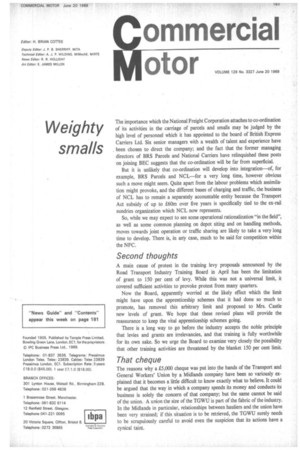Weighty smalls
Page 185

If you've noticed an error in this article please click here to report it so we can fix it.
The importance which the National Freight Corporation attaches to co-ordination of its activities in the carriage of parcels and smalls may be judged by the high level of personnel which it has appointed to the board of British Express Carriers Ltd. Six senior managers with a wealth of talent and experience have been chosen to direct the company: and the fact that the former managing directors of BRS Parcels and National Carriers have relinquished these posts on joining BEC suggests that the co-ordination will be far from superficial.
But it is unlikely that co-ordination will develop into integration—of, for example, BRS Parcels and NCL—for a very long time, however obvious such a move might seem. Quite apart from the labour problems which assimilation might provoke, and the different bases of charging and traffic, the business of NCL has to remain a separately accountable entity because the Transport Act subsidy of up to £60m over five years is specifically tied to the ex-rail sundries organization which NCL now represents.
So, while we may expect to see some operational rationalization "in the field", as well as some common planning on depot siting and on handling methods, moves towards joint operation or traffic sharing are likely to take a very long time to develop. There is, in an'y case, much to be said for competition within the NFC.
Second thoughts
A main cause of protest in the training levy proposals announced by the Road Transport Industry Training Board in April has been the limitation of grant to 150 per cent of levy. While this was not a universal limit, it covered sufficient activities to provoke protest from many quarters.
Now the Board, apparently worried at the likely effect which the limit might have upon the apprenticeship schemes that it had done so much to promote, has removed this arbitrary limit and proposed to Mrs. Castle new levels of grant. We hope that these revised plans will provide the reassurance to keep the vital apprenticeship schemes going.
There is a long way to go before the industry accepts the noble principle that levies and grants are irrelevancies, and that training is fully worthwhile for its own sake. So we urge the Board to examine very closely the possibility that other training activities are threatened by the blanket 150 per cent limit.
That cheque
The reasons why a £5,000 cheque was put into the hands of the Transport and General Workers' Union by a Midlands company have been so variously explained that it becomes a little difficult to know exactly what to believe. It could be argued that the way in which a company spends its money and conducts its business is solely the concern of that company; but the same cannot be said of the union. A union the size of the TGWU is part of the fabric of the industry. In the Midlands in particular, relationships between hauliers and the union have been very strained; if this situation is to be retrieved, the TGWU surely needs to be scrupulously careful to avoid even the suspicion that its actions have a cynical taint.










































































































































































































































































